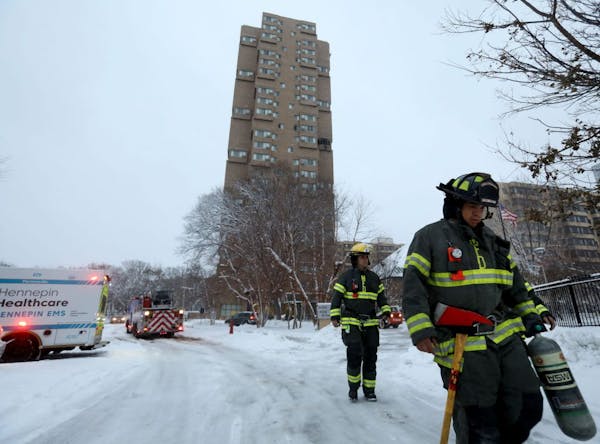A lack of extensive sprinklers, an outdated stairwell design and a seal that prevented a door from closing contributed to the spread of the fire that killed five people in the Cedar High Apartments last year, according to a new state report.
The Minnesota Department of Public Safety's Fire Marshal Division (SFMD) on Tuesday released an 18-page report recommending multiple changes, as a result of its investigation into the Nov. 27, 2019, fire in the high-rise building run by the Minneapolis Public Housing Authority.
"This tragic loss of life could have been prevented. The victims would still be alive had there been sprinklers throughout that entire building," State Fire Marshal Jim Smith said in a statement. "We owe it to the victims and their families to learn from this fire so we can prevent similar tragedies."
The 25-story building at 630 S. Cedar Av. had sprinklers in the basement area and some common spaces on the first floor. It did not have them throughout the entire building, which was built 50 years ago.
The fire marshal's division, in its report, said that in 63 of 65 "sprinkler saves" recorded in high-rise buildings between 2004 and 2019, the fire was controlled with one or two sprinklers.
"It is the SFMD's position that all high-rise buildings should be protected with fire sprinkler systems," the report said. "Had this building been protected with fire sprinklers, it is the opinion of the SFMD that no loss of life would have occurred."
The Minneapolis Public Housing Authority (MPHA) said its executive director, Abdi Warsame, was not available to discuss specifics of the report, its recommendations or the fire. When the fire happened, Warsame was a Minneapolis City Council member whose ward included the high-rise. He spent that morning last year meeting with grieving, traumatized residents.
In a statement Tuesday, the authority said it was reviewing the fire marshal's report.
It said in-unit sprinklers "remain a top priority" and that MPHA has a plan to install complete sprinkler systems in all of its high-rise buildings within 10 years "given sufficient funding."
"Decades of federal underfunding have left MPHA with a need of more than $150 million of essential repairs and updates to its 6,000 public housing units," the statement said. "Against this, the agency receives approximately $15 million annually for capital repairs from Congress."
MPHA's plan calls for adding sprinklers to six more buildings in 2021, though not the building where the fatal fire occurred.
The fire marshal's report also recommends other changes for high-rise buildings throughout the state, based on how the fire in Cedar-Riverside spread.
The office suggested installing a fire separation barrier inside buildings with "scissor stairs," such as the Cedar High Apartments, or installing sprinklers throughout the building. The term "scissor stairs" refers to a design where multiple doorways open into a single shaft, containing multiple staircases.
"Since both stairways are located within the same enclosure, or 'shaft,' a single open door can quickly compromise both stairs, which are the only paths of egress from the upper stories of the building," the report said.
The report described that as "a design practice from decades ago — especially in high-rise buildings — to save space and the cost of building a second enclosure. Unfortunately, this practice was incongruent with the safe egress concept of having two ways out in an emergency."
Based on burn patterns, investigators also suspect that the door to the apartment where the fire began was open.
"Had the door been closed, the smoke and heat spread from the apartment into the corridor and ultimately into the scissor stair enclosure would have been limited," the report said.
"Although the corridor/apartment separation doors were equipped with self-closing devices, the closing feature was rendered ineffective by the placement of seals at the bottom of the doors that prevented the doors from closing. Although the exact reason for the seals is unknown, it is presumed that they were to prevent infestation spread or to prevent loss of heat from the individual apartment."
The report did not say who placed the seals on the doors, and MPHA did not answer that question.
The report also noted that a window failed, likely due to the heat, and strong winds created a "wind-driven fire" that, together with the open door, contributed to the fire's spread.
The fire killed Amatalah Adam, 79; Maryan Mohamud, 69; Nadifa Mohamud, 67; Jerome Stuart, 59; and Tyler Scott Baron, 32. All died of smoke inhalation.
Liz Navratil • 612-673-4994

Souhan: Wolves fans made Game 1 special. Now bring on Game 2.

Kao Kalia Yang, Edel Rodriguez and others bring us gorgeous new picture books
Tip sparks new search for Blaine woman who went missing 30 years ago

